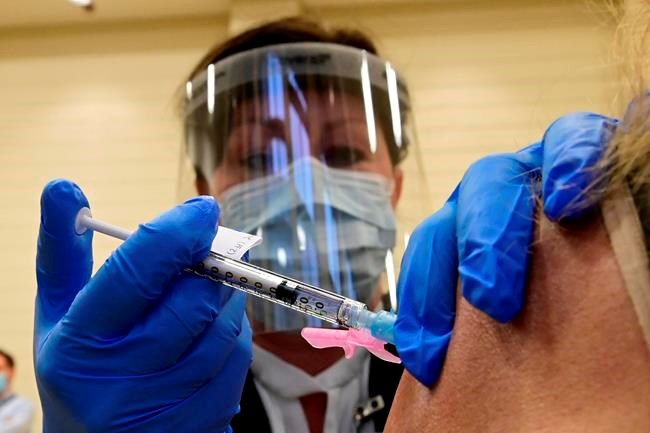Tens of thousands of seniors in the Prairies secured appointments to receive COVID-19 vaccines Wednesday as officials in the two provinces hardest hit by the pandemic laid out their own plans for inoculating older residents.
The launch of vaccine reservations in Alberta saw some 20,000 slots filled as of early Wednesday afternoon, just hours after the province opened up bookings to those born in 1946 or earlier, public health officials said.
But the process was not without hiccups as many hoping to book shots for elderly relatives reported difficulties accessing the government's website and phone line.
Kim Fandrick, who sought to make appointments for her parents, said she logged on to the government portal at 8 a.m. only to have it crash. Later attempts saw her kicked off the site before she could submit the forms.
Fandrick, who lives with her parents in a rural area south of Edmonton, also tried the 811 health line and got a busy signal.
In the end, she managed to reserve shots for both of them, but at different times, requiring four separate trips to the city so her parents can each get two doses.
"It's just disappointing that I couldn't book both of them at the same time," she said.
The provincial health agency said more staff were brought in to manage the surge in calls to 811, but Alberta's top public health doctor has advised people to be patient, noting there are 230,000 people in the eligible age group.
Appointments were also made available Wednesday to Manitobans over the age of 95, or over 75 for First Nations individuals, as the province began to roll out vaccines to the general population. So far, only those in designated groups such as health-care workers had access to the shots.
In Quebec, one of the two provinces most affected by COVID-19, officials said residents born in 1936 or earlier would be able to reserve vaccinations starting Thursday. The Montreal region is a priority, they said.
The move comes as the province, which has so far focused its vaccine campaign on seniors' homes, seeks to inoculate as many residents 70 or older in an effort to protect them against dangerous new variants of the virus.
"This vaccination of the most vulnerable population is going to help us protect them from the most severe form of the disease," said Dr. Mylene Drouin, who heads Montreal's public health department.
Ontario also laid out its timeline for vaccinating older residents on Wednesday, announcing that a booking system similar to Alberta's would be made available March 15 for those 80 and older, and opened up to younger seniors in the weeks and months after. Health officials stressed, however, that the timeline largely depends on the province's supply of vaccines.
The head of the province's vaccination task force, retired Gen. Rick Hiller, said those 75 and older should start getting immunized mid-April, and those 70 and older at the start of May. Ontarians 65 and over will be next in June, and those 60 and older will start getting shots the following month.
Moderna, one of two drugmakers with a COVID-19 vaccine currently approved for use in Canada, confirmed Wednesday it will ship 1.3 million doses to Canada next month. The shipments will fulfil the company's contract to ship two million doses by the end of March.
Prime Minister Justin Trudeau also said 1.5 million doses of the vaccine made by Pfizer-BioNTech would delivered in the first two weeks of April. Pfizer is shipping 2.2 million doses in March.
Meanwhile, the National Association of Friendship Centres called on Ottawa to co-ordinate a vaccine rollout for Indigenous people living in urban communities, as it is doing in collaboration with First Nations and Inuit governments for those on reserves.
The organization's executive director, Jocelyn Formsma, called on the federal government to consider doling out doses to clinics serving Indigenous people in urban areas, rather than waiting for the provinces to do it. She said more than 50 clinics run by her organization could administer the shots.
But Indigenous Services Minister Marc Miller said the distribution of vaccines to Indigenous people outside of reserves will be faster and more efficient if done through the provinces.
At the same time, active cases of the virus in First Nations communities are going down across Canada, the minister said. He reported 1,443 active cases on reserves as of Tuesday, adding vaccinations have begun in 440 Indigenous communities.
Surging cases prompted officials in the Nunavut community of Arviat to declare a state of emergency Wednesday, and impose a curfew from 10 p.m. to 6 p.m. effective immediately.
There are currently 27 active cases in the community of about 2,800 people, which was previously the centre of Nunavut's largest COVID-19 outbreak.
This report by The Canadian Press was first published Feb. 24, 2021.
Paola Loriggio, The Canadian Press



